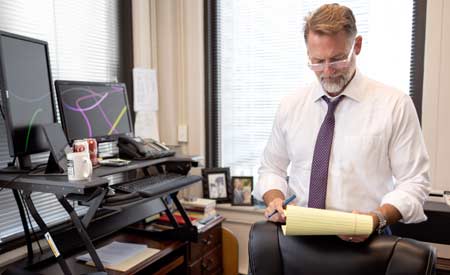CASE NOTES
Summaries of recent legal matters in and around Chicago
ATTORNEY MISCONDUCT SCUTTLES $25 MILLION SETTLEMENT IN YACHTING INJURY CASE.
Scot Vandenberg, et al. v. Brunswick Boat Group, et al., Cook County Case No. 10 L 3188
In September of 2009, a 43-year-old male hosted a cruise on a chartered yacht. While he was seated on a portable bench on the top rear deck, it tipped backward and he fell to the bottom deck. He suffered spinal injuries which extended hospitalization and multiple surgeries, left him confined to a wheelchair, paralyzed below the chest, with minimal ability to move his arms and no fine motor control below the elbows. He requires extensive assistance, and is at risk for future complications, with $1 Million in past medical/care costs and approximately $14 Million in future costs.
The man was CEO of an ambulance company. He could not continue working and had to sell his shares, leading to claims for approximately $25 Million lost income/profits. His wife claimed loss of consortium. The Plaintiffs sued for $103 Million, claiming that the yacht was inherently dangerous because of the lack of a guard railing on the edge of the rear upper deck. The manufacturer defendant argued the yacht had been originally built to specifications for a private owner; that the cruise operator failed to update the safety features or to register the boat for commercial use; and that inherent dangers of the upper deck were open and obvious and in an area not intended for passenger use. Before trial began the cruise operator settled for a confidential amount, but remained on the verdict form, thus enabling assertion of an “empty chair” defense. Before trial, the Plaintiffs’ demand was $54 Million and the Defendant’s offer was $25 Million.
The case went to trial in May of 2015. After four weeks, the jury began deliberations. After an hour and a half, the jury sent the judge a note inquiring if they could assign 100% of liability to the “empty chair” defendant. The judge ordered her clerk to contact both sides’ counsel, to tell them of the existence of the note, and to come to court to learn its contents. The clerk reportedly told Plaintiffs’ counsel about the note almost immediately but did not call Defendant’s counsel for another 29 minutes. During that time, Plaintiffs’ counsel called Defendant’s counsel and settled the matter for $25 Million.
When Defendant’s counsel got to court, he first learned of the half hour delay before he had been told of the jury note. Then, the judge did not inform the jury of the settlement but, instead, answered the jury’s question and asked them to continue deliberations. Within five minutes, the jury returned a complete not guilty verdict. Defendant’s counsel moved that verdict be entered and that settlement vacated. Plaintiffs’ counsel objected.
Six months later, after extensive motion practice, a different judge held several days of evidentiary hearing to determine what had occurred and what should be done with the $25 Million settlement and $Zero verdict. Evidence included a memorandum from the trial judge with her account of events; testimony by the judge’s clerk; testimony by a judicial extern/law student; testimony by defense counsel; testimony by the Defendant’s insurance adjuster; and testimony by the Plaintiffs’ counsel.
Testimony from various sources, as well as courthouse phone records, indicated, that once the clerk learned of the jury’s question, she: immediately called and told Plaintiffs’ counsel what the jury had asked; agreed to hold off on telling defense counsel; waited almost half an hour to call defense counsel and tell him the jury had a question; told a co-worker that she was holding off on calling defense counsel because she liked to give an edge to plaintiffs in settlement; and then told the judge that she had called both sides’ counsel at the same time.
Other testimony indicated that, with the above-noted information known only to him, Plaintiffs’ counsel quickly called the Defendant’s insurance adjuster directly and agreed to a settlement of $25 Million even though counsel had just rejected an offer for that amount at the beginning of jury deliberations; and that Plaintiffs’ counsel told the judge that neither he nor defense counsel cared what was in the jury’s note, despite not having even talked to defense counsel.
Although the judge presiding over the evidentiary hearing ultimately did not rule that there was an actual conspiracy between Plaintiffs’ counsel and the court clerk, he did find that their actions put the Defendant at an unfair disadvantage. He also found that it was not credible for Plaintiffs’ counsel to claim that he was unaware that the defense did not know of the jury’s question while he was quickly negotiating the settlement, and that Plaintiffs’ counsel misled them by staying silent about it. This judge also found the clerk to have been untruthful in her testimony during the evidentiary hearing. Thus, the judge set aside the settlement. He encouraged the parties to try to resolve the matter or else he would be forced to decide whether to enter the jury’s verdict or order a whole new trial.
However, no settlement was achieved, and the court took the next step and entered judgment in complete favor of the defense. Plaintiffs are appealing.
HALLOWEEN PARTIER TRIES TO SLIDE DOWN HOTEL BANNISTER, FALLS TO HER DEATH, AND FAMILY RECOVERS MILLIONS AT TRIAL
Estate of Megan E. Duskey, deceased v. Hilton Worldwide Inc., Cook County No. 12 L 8230.
A case that made Halloween headlines six years ago has finally come to its legal conclusion.
On October 30, 2010, a 23-year-old school teacher was at a Halloween Ball at the Palmer House Hilton Hotel. The hotel restricted entrance to the Ball by having partygoers use a designated route for access to the fourth floor ballroom and by allowing them to use only one specific bank of elevators (with four cars). However, no specific exit route was designated. Partygoers were allowed to exit through common areas and stairways, but were not allowed to use the main bank of elevators on the fourth floor for egress.
At some point, the teacher and her friends decided to go outside. Reportedly unsure how to exit, they made their way to the third floor where they were reportedly directed down an escalator to the mezzanine level, where there were no security guards. At this time the teacher climbed onto a spiral staircase bannister and fell four floors to her death. She was later determined to have a blood alcohol level of .193.
The estate sued for $16 Million, claiming the hotel was negligent in failing to identify the spiral staircase as a safety risk to attendees in costumes with masks that could impair eyesight and footwear which could impair movement, and by failing to take into account that partygoers could be drunk which impaired coordination, balance and judgment, which thus increased the risk of falling on stairways. The estate also claimed the hotel failed to provide the safest means for attendees to exit, via elevators, and failed to post warnings against using the spiral staircase which would be dangerous to partygoers. The defense claimed the planning was proper and that the deceased was the sole cause of her own death by drinking to excess and trying to slide down the bannister.
At trial, the Plaintiffs’ settlement demand was $4.7 Million and the Defendant offered $330,000. During trial, the court struck the affirmative defense of comparative negligence due to non-compliance with motion in limine rulings. With a verdict that should put a scare into defendants everywhere, or at least those who might find themselves haled into a Cook County Circuit Court, the jury returned a verdict of $4 Million against the hotel.



